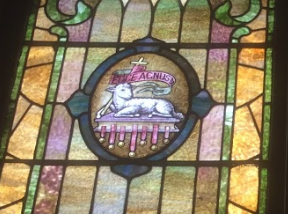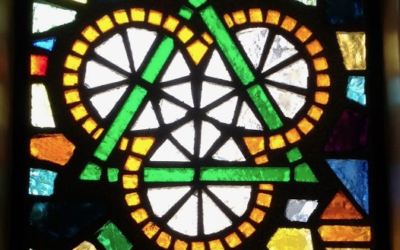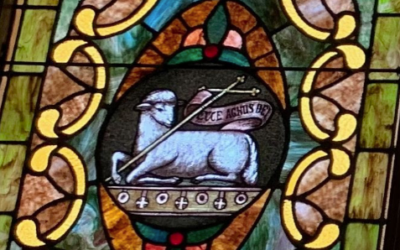God guides out decisions with His word
Watch the service

Read the sermon
Christ’s Love Changes Us
Why doesn’t your religion condemn slavery? Imagine, for a moment, that your neighbor; your co-worker asked you that question. How would you respond? Maybe you might say, “sure it does. The bible is all about freedom.” And then the person says, “really? So then, show me where there is a condemnation of slavery in the bible.” What would you say? Way back, when I was at our Seminary, our professor asked us that question. And, as usual, we didn’t really know what to say in response. So let us know that the bible doesn’t really condemn slavery—at least in the way we might expect. And, this morning we have the rare opportunity to take up the topic of slavery—but not through the eyes of the world. Instead, we have the opportunity to take up the topic of slavery through the eyes of Christ’s love for us. In Paul’s letter to Philemon we get to read and learn more about this: “1 Paul, a prisoner of Christ Jesus, and Timothy our brother, To Philemon our dear friend and fellow worker— 7 Your love has given me great joy and encouragement, because you, brother, have refreshed the hearts of the Lord’s people. 8 Therefore, although in Christ I could be bold and order you to do what you ought to do, 9 yet I prefer to appeal to you on the basis of love. It is as none other than Paul—an old man and now also a prisoner of Christ Jesus— 10 that I appeal to you for my son Onesimus, who became my son while I was in chains. 11 Formerly he was useless to you, but now he has become useful both to you and to me.” (Philem. 1:1, 7–11 NIV11-GKE)
People are messy. That is what life looks like after the fall into sin. And these words are a good example of this. Slavery is horrible. It is a horrible fact of life on this earth because it uses people and robs them of what they have and are—and without their permission. Slavery makes a person worthless. And so, we might ask the question, “why does this guy by the name, Philemon, have slaves at all if he’s a Christian?’” From everything we can tell, Philemon is a new Christian. And one of the difficulties we face as Christians is figuring out how to be and behave as a Christian when we are surrounded by unbelievers. If you are a slave-owner who becomes a Christian, how do you treat the slaves under your care who are not Christians?
And with that in mind, we can begin to speak about Onesimus. The name, “Onesimus” means useful.1 But Onesimus was the opposite of useful. Paul admits that Onesimus was “useless.”2 He was selfish and reckless. And in these words Paul continually talks about paying back money. So there is the hint that Onesimus not only ran away, but he stole Philemon’s money to get away.
So, my dear friends in Christ, put yourself in Paul’s sandals for a moment. What do you do about the slavery that Philemon won’t seem to give up? What do you do about the uselessness and selfishness that Onesimus will not give up? Paul shares Christ’s love. And the love that Christ has for each of them changed them. Christ’s love changed Paul. Paul used to be Saul—a persecutor of Christ’s church. Now, in Christ he was forgiven. Christ’s love for Philemon changed him. Philemon, instead of concluding that his destiny and destination was hell, which he deserved, he knew that he had a new, different destination: heaven. And finally, Christ’s love changed Onesimus. Onesimus learned that his greater, bigger slavery was the on he had to sin, death, and the Devil. But Christ changed all of that by freeing Onesimus from that slavery. And he now lived up to his name. He was so very useful to Paul in his prison chains. That’s what Paul shared with each of them—Christ’s love for them. For it is that love which changed their destination. But Christ’s love changed each of them in a different way too: “12 I am sending him—who is my very heart—back to you. 13 I would have liked to keep him with me so that he could take your place in helping me while I am in chains for the gospel. 14 But I did not want to do anything without your consent, so that any favor you do would not seem forced but would be voluntary. 15 Perhaps the reason he was separated from you for a little while was that you might have him back forever— 16 no longer as a slave, but better than a slave, as a dear brother. He is very dear to me but even dearer to you, both as a fellow man and as a brother in the Lord. 17 So if you consider me a partner, welcome him as you would welcome me. 18 If he has done you any wrong or owes you anything, charge it to me. 19 I, Paul, am writing this with my own hand. I will pay it back—not to mention that you owe me your very self. 20 I do wish, brother, that I may have some benefit from you in the Lord; refresh my heart in Christ. 21 Confident of your obedience, I write to you, knowing that you will do even more than I ask.” (Philem. 1:12–21 NIV11-GKE)
Christ’s love changes our destination. But also, what does Christ’s love do? It changes our determination. Many years ago there was a pamphlet I saw. It was used by well-meaning, but poorly trained Christians for evangelism. And the pamphlet said, “God has cast his vote: he wants you in heaven. Satan has cast his vote. He wants you in hell. What will your vote be?” All of us, every one of us, when we come into this world does not have a free will. Instead, we have an enslaved will. We serve our sin. We serve ourselves. And we are unable to choose Jesus. So Jesus does the miraculous and amazing. He changes our determination. Instead of being determined to serve ourselves and our sin, God gives us a new nature. And this new nature naturally, and spontaneously serves others. It asks, “what can I do for you?”
When we understand this, we begin to understand how our wise God deals with slavery. God worked a miracle and gave Philemon a new birth. Philemon then naturally worked to provide for others. The Lord gave Onesimus a new birth. After that the man who was useless became useful. With that in mind, the whole topic of slavery begins to sort itself out on its own. And then we can begin to understand other parts of the bible. For many years I would read through Genesis with my parents and kids in catechism class. And we would get to the part where Abraham sends his old servant up north to get a wife for his son, Isaac.3 And we get this long, extended section of scripture where this old, exceedingly wise servant aggressively tries to get a wife for Isaac. And, for years, what shocked me was how Eliezer spoke. Close to 20 times in that part of the bible Eliezer calls Abraham his “master.”4 And there was the part of me that cringed a little on the inside that he would so willingly call himself that. But when we read these words here in Philemon we begin to put it all together. Christ’s love had changed Abraham. He had a new destination and a new determination. Christ’s love had changed Eliezer. He too had a new destination and determination.
Finally then, let’s end where we began. Someone asks you, “Why do you belong to a religion that doesn’t contemn slavery?’” And now we have a framework for an answer. When we see Christ’s love for us, then we have a destination and a determination. We have the same status as children of God. And yet, where we see differences and weaknesses, we willingly, gladly, spontaneously, and naturally help each other up. This is in complete contrast to an atheistic worldview. First, an atheistic worldview cannot rescue a person from their ultimate destination of hell. You can give everyone a home worth a million dollars. And each of them will no help for their slavery to sin. Only Jesus can do that. But sadly, there’s a second truth. The atheistic worldview cannot rid the world of slavery even now. We went out west on vacation. And we went hiking into an old mining town. It had gone out of business about a hundred years ago. But there were men who went to mining camps like these. The mining company paid for their transportation. The company paid for their lodging and food. The problem was that in a number of these camps, the miners couldn’t make enough money to pay off their debts. So there’s this powerful irony: They lived in the land of the free. But, economically, their freedom only existed on paper. God’s way is better. For Christ’s love changes our hearts. It gives us a new destination. It gives us a new determination. Amen.
1 BDAG, s.v. “Ὀνήσιμος,” 711.
2 “ⲁⲭⲣⲏⲥⲧⲟⲛ” (Philem. 1:11 GNT-ALEX)
3 ”עַבְדּוֹ֙ זְקַ֣ן“ (Gen. 24:2 HMT-W4)
4 ”אֲדֹנִ֣י“ (Gen. 24:12 HMT-W4), et al.



